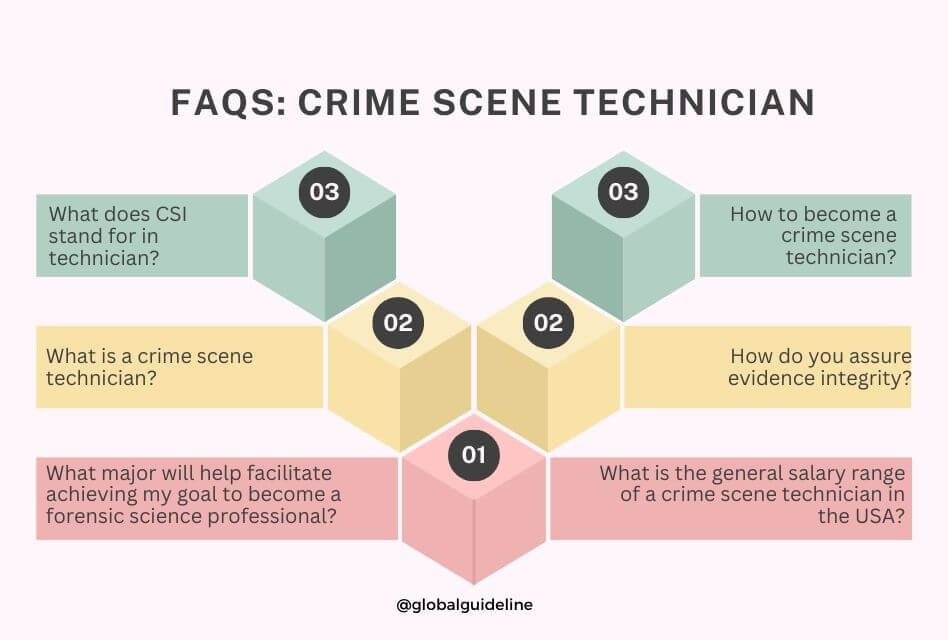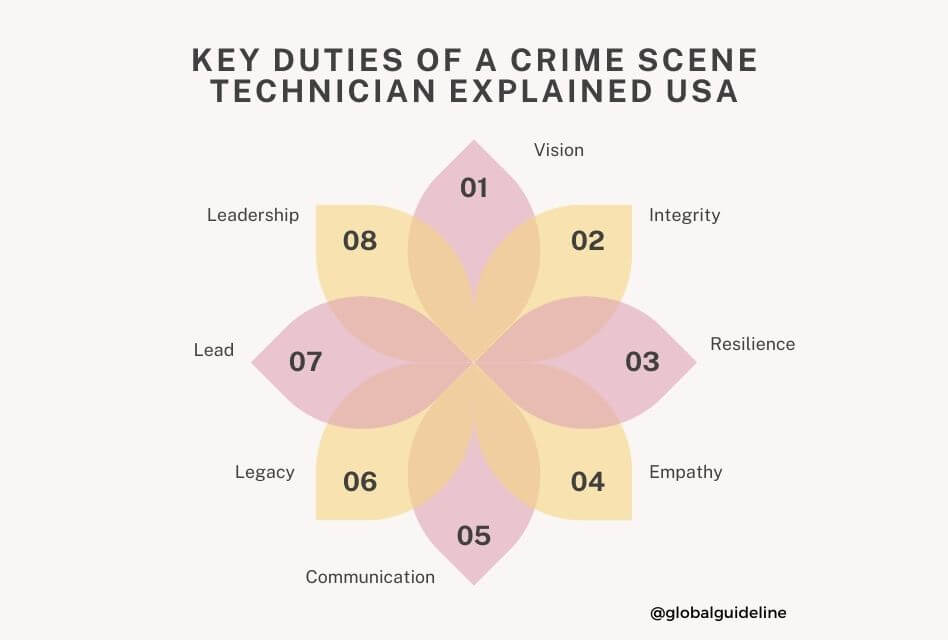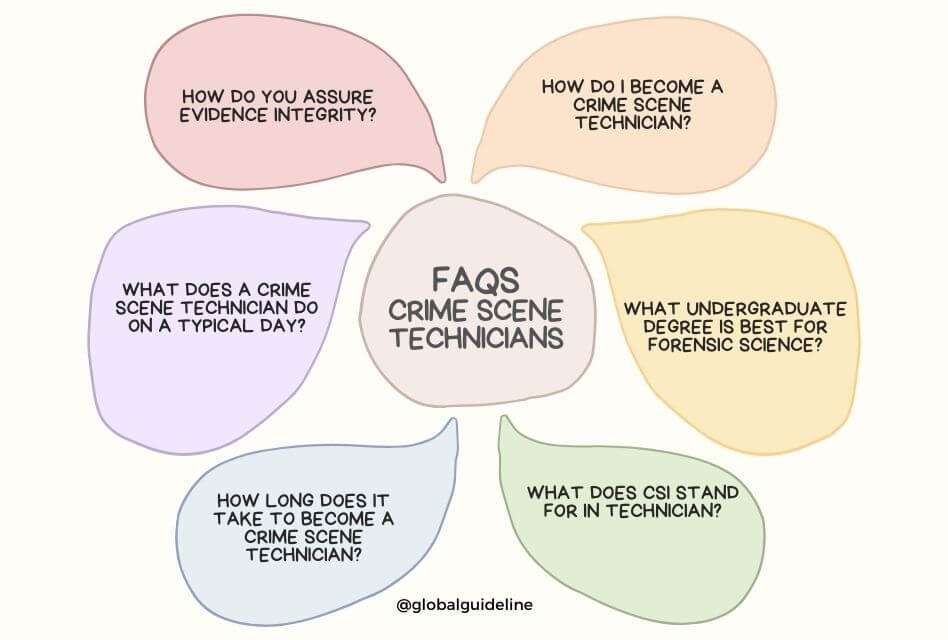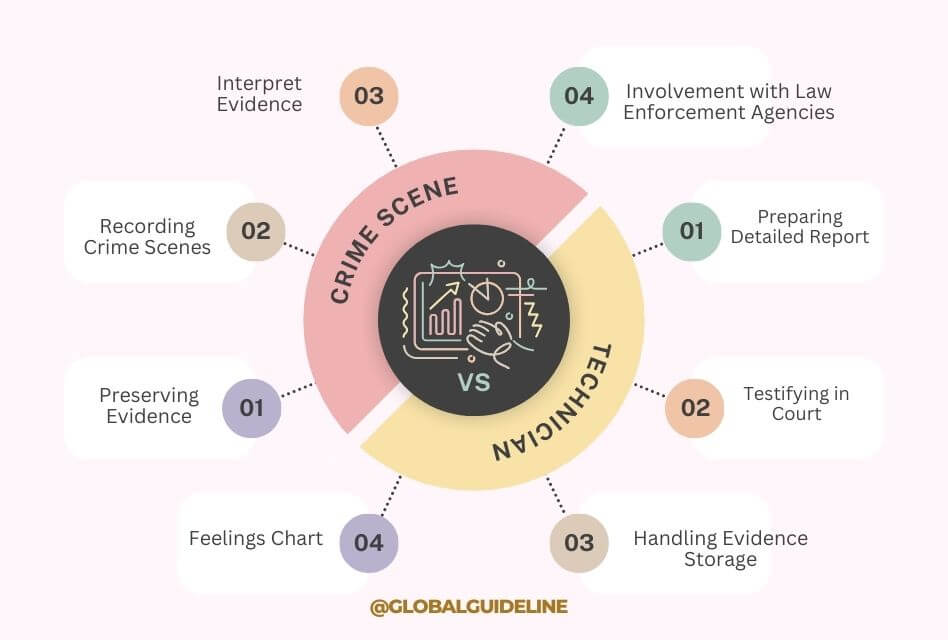A crime scene technician is at the heart of the criminal justice system. The technician works closely with the investigator and law enforcement, often times taking great pains in collecting and analyzing the evidence found at crime scenes. These are the 10 key tasks that make up a crime scene technician’s job, an inside look into what they do, what kind of skills they need, and even how one transitions into this career.
Table of Contents

1. Collect and Preserving Evidence
Crime scene technicians are primarily charged with the responsibility of collecting and preserving evidence at the scenes of crimes. In this, they collect physical evidences such as blood samples and fingerprints, among other materials that may be helpful in solving a crime.
What is a Crime Scene Technician?
The crime scene technician takes note of the place where evidence exists so that, without contaminating it, it is collected. This plays a major role in ensuring that the integrity of the evidence is preserved for eventual use in a court case.
2. Recording Crime Scenes
Documenting crime scenes is another vital task. Technicians must photograph, sketch, and note particular things about the scene to replicate it in detail. Such documentation would be vital for investigators since it serves as a visual record that would be adhered to during the investigation.
How Do I Become a Crime Scene Technician?
Becoming a crime scene technician requires a high school diploma or GED. Furthermore, technicians usually continue their education in forensic science or criminal justice. Virtually every technician completes their formal education with additional certification in a crime scene technician program as an added qualification.
3. Interpret Evidence
The crime scene technicians are then expected to examine and interpret the evidence, which might include special-use equipment for a latent fingerprint, blood spatter pattern, or any other mode of physical evidence. For this, the purpose is to provide information that could assist in solving the crime.
What undergraduate degree is best for forensic science?
A bachelor’s degree in forensic science or criminal justice – or a related area of study – is typically recommended for the crime scene technician. Such programs provide foundational understanding of evidence analysis and criminal investigations.
4. Involvement with Law Enforcement Agencies
Crime scene technicians work extensively with both local, state, and federal law enforcement agencies. Often, these individuals serve as assistants to CSIs, contributing technical knowledge related to evidence collection and analysis.
What Does CSI Stand for in Technician?
CSI stands for Crime Scene Investigator. The CSIs usually are much more on the inside of the investigation process, whereas technicians focus more on the technical evidence collection and analysis process.
5. Preparing Detailed Report
After processing a crime scene, technicians submit detailed reports summarizing their findings. These will be submitted to investigators, prosecutors, and sometimes to defense attorneys to help understand the evidence they have collected and other case-building matters.
Crime Scene Technician Salary in the United States
Salary: A crime scene technician in the U.S. may earn a different amount depending on various factors like location, experience, and education; however, an annual salary for this function usually falls within the range of $40,000 to $70,000 with prospects for increased compensation in specific regions or job specializations.
6. Testifying in Court
Crime scene technicians may be called as expert witnesses in court for testimonies. Testifying could be crucial in explaining to the court how evidence was collected and analyzed, as well as what the findings mean.
Crime Scene Technician Certification
Proper certification programs would involve organizations such as the International Association for Identification, where a technician’s expertise in court testimony would be enhanced. Certification also shows a high level of professionalism and dedication to the work.
7. Handling Evidence Storage
Evidence collected shall be preserved and stored with minimal damage or contamination. The labeling, cataloging, and storing of evidence by crime scene technicians are carried out in the most secure way possible before it is required for further analysis or court trial.
How Long Does It Take to Become a Crime Scene Technician?
In general, to become a crime scene technician, one must combine education, training, and experience. The minimum time span it takes will depend on the chosen educational career path: as short as 1 to 4 years.
8. Training and Education
More experienced forensic technicians may also teach new technicians how to do their jobs or teach police officers regarding evidence-collection techniques. This serves to ensure that everyone who participates in an investigation has been educated on proper tactics.
Crime Scene Technician Education Requirements
In fact, the education requirements for crime scene technicians vary by actual job. Still, an associate’s degree or bachelor’s is usually advised in almost any field. The specialized skills obtained through certificate programs in becoming a crime scene technician are definitely in high demand among employers.
9. Handling Biohazardous Materials
Crime scenes and biohazards The biohazardous material is, for example, the blood or other bodily fluid. The handling of biohazardous material must be done according to strict procedures in order not to endanger crime scene technicians themselves and others.
Crime Scene Technician Training
Handling biohazardous materials is an essential component in the training of a crime scene technician, considering that this enables the technicians to collect and process evidence in a safe and effective manner.
10. Continuous Learning and Adaptation
The field of forensic science is becoming newer every day, and accordingly, a number of new technologies and methods are being developed. Crime scene technicians are required to update all such developments in their repertoire through continuous learning and professional development.

Crime Scene Technician Jobs
There are various jobs of crime scene technicians in the United States, from entry-level jobs to advanced positions. Crime scene technician jobs can be found in local law enforcement agencies, federal agencies, and private forensic labs.
Job Interview Preparation: Common Questions for Crime Scene Technicians
When you are preparing for a crime scene technician job interview, you will be talking about your skills, your experiences, and your knowledge of the field. Some of the common questions you can expect in an interview include:
- What does a crime scene technician do on a typical day?
- Be prepared on the day-to-day discussions of taking evidence, documenting it, and working with law enforcement.
- How do you assure evidence integrity?
- Explain how you prevent contamination and ensure that the evidence is documented and stored properly.
- Can you give me an example of a particularly challenging crime scene you have worked on?
- Describe a specific case that explains your problem-solving skills and your ability to be focused in high pressure situations.
FAQs: Crime Scene Technician
What does CSI stand for in technician?
CSI is the abbreviation for Crime Scene Investigator, a position that involves much more investigation than technical orientation in the crime scene technician.
What is the general salary range of a crime scene technician in the USA?
On average, a crime scene technician in the United States can earn between $40,000 and $70,000 per year, although this range will depend largely on location, experience, and educational background.
What major will help facilitate achieving my goal to become a forensic science professional?
A bachelor’s degree in forensic science, criminal justice, or a closely related discipline may be suitable when considering a job in becoming a crime scene technician.
How to become a crime scene technician?
Typically, the requirement for education is a high school diploma or GED. Thereafter, specialized education and training in forensic sciences or criminal justice are the usual subsequent disciplines. Certification programs may be offered to make the qualification even stronger.
What is a crime scene technician?
A crime scene technician is a professional whose prime work revolves around the collection and preservation of physical crime evidence from crime scenes so that an analysis of such evidence can be made for the investigation of crimes.

Conclusion: The Vital Role of Crime Scene Technicians
They are one of the most critical support roles in the entire criminal justice process because they ensure to collect evidence from and analyze the crime scene with the highest precision and care. The profession does not only provide the various law enforcement agencies but also further supports the cause of justice. With the on-going development in forensic science, the need for a skilled crime scene technician will, therefore, most certainly increase, making this a rewarding and impacting career choice.
The 10 Key Duties of a Crime Scene Technician Explained USA This comprehensive guide about what is needed in order to succeed in this field will serve as a great discussion for the expectation of anyone considering making a career in crime scene technician or looking forward to advancing in his current role.
Related Post:
10 No Experience Jobs Near Me: Start Your Career Today!
How Can 5 Entry Level Computer Science Jobs Help You Launch Your Career?










